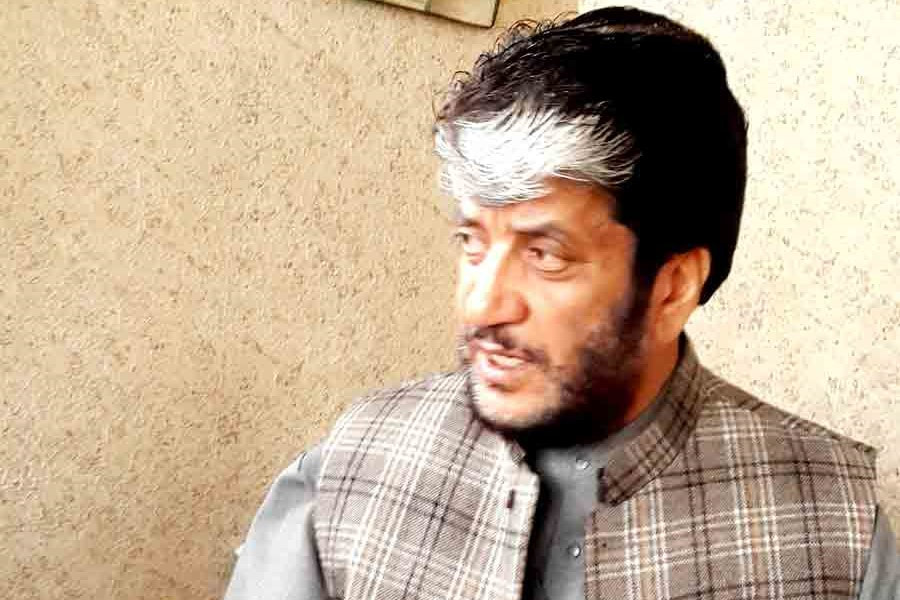Shabir Shah: Detailed Biography
After 35 years in prison, Shabir Shah becomes a victim of Indian-Settler Colonial Policies in Kashmir
|
1. Introduction
Shabir Shah, 67, one of the most popular and respected political leaders in Indian Administered Kashmir, is currently serving out his 35th year of detention. Born in 1954, Shah was first arrested and detained in 1968 for organizing a protest against the Indian Government to demand self-determination for Kashmiris. In 1993, Amnesty International declared him a Prisoner of Conscience after a thorough investigation. In 1995, India's Prime Minister P. V. Narasimha Rao offered Shah the position of Chief Minister of the autonomous state of Kashmir. A.S. Dulat, former Chief of Indian intelligence agency Research and Analysis Wing (RAW) and the Intelligence Bureau (IB), wrote in his 2015 book, Kashmir: The Vajpayee Years, that he met Shah on several occasions, offering him Chief Ministership of Kashmir in the mid-1990s, on the orders of then Prime Minister Narasimha Rao. Shah rejected the offer. Dulat also writes that he gave the title of 'Nelson Mandela of Kashmir' to Shah. Within the last 53 years, Shah was repeatedly arrested on charges under the Indian Government's emergency laws, such as the Terrorist & Disruptive Activities Prevention Act (TADA), and the Public Safety Act (PSA). These draconian acts don’t require any charge sheets, warrants, or prior legal formalities and proceedings. Despite spending 34 years in pretrial detentions, the Indian Government could never prove any charge against Shah. However, in 2005, police charged Shabir Shah for the first time under the criminal offence of “money laundering”. 2. Political Ideology During his half-century-long political struggle, Shah never succumbed to the lures of militancy or terrorism. Shah's father died in police custody in 1989. Despite this, Shah still advocates for a peaceful solution to the Kashmir conflict through dialogue and promotion of Kashmiri aspirations. Shah calmly reiterated on various occasions that he is not against India or any other nation. Shah rejects solutions that do not consider the opinions and choices of Kashmiris. 3. Current Circumstance Shabir Shah was last arrested on 25 July 2017 in a 2005 money laundering case. According to the charge sheet, Delhi’s Special Cell Police arrested Aslam Wani, an alleged hawala dealer. Police claimed that they recovered 6.3 million rupees from Wani, of which 5.2 million (Rs) was to be allegedly delivered to Shah (according to Wani). Initially, Wani pleaded not guilty. However, according to the prosecution, Wani later claimed he gave 230 million rupees to Shah. These charges are dependent on flimsy evidence provided by the accused Wani. Ironically, courts granted bail for Aslam Wani, but dismissed repeated bail requests from Shah. Shabir Shah, a highly respected political leader, and someone previously offered the highest political office in Kashmir, has now been accused of money laundering based on dubious charges. Moreover, within the last four years, the prosecution could not provide concrete evidence against him. According to international human rights law, prolonged detention without charge is considered arbitrary detention. According to the unfounded charges, Shah was initially charged with money laundering only. The Enforcement Directorate (ED) prosecutor later added “terror funding” charges, in addition to “colluding with Pakistan”. According to Shah’s family, no court proceedings have ever taken place in the last four years. 4. Character Assassination and Media Trial Shah is portrayed in Indian media as a “Pakistani agent who incites terror in Kashmir with the help of Pakistani funding”. In 1989, Shah was arrested on charges of fleeing to Pakistan. However, former Indian Intelligence Bureau Director, Dulat, himself admits that Shah never visited Pakistan. In the absence of concrete evidence and with strong hysteria, Indian media has constantly repeated the rhetoric that Shah is under arrest for a terror funding case. Media sources portrayed Shah as a “Pakistani agent” and “terror supporter”, failing to mention that prosecutors never proved his guilt for any charges in the court. False charges against Shah resulted in 30 years of arbitrary pretrial detention. The culmination of Shah’s false media portrayal illustrates clear character assassination of a human rights activist, political leader, and an individual declared a Prisoner of Conscience by Amnesty International. The political nature of Shah’s character assassination is evident. Moreover, the decades-long smear campaign targeting him has been the cause of mental torture for his family. 5. Trouble for Shah's Wife and Daughters In 2020 the prosecution also charged Shah’s wife, Bilquies Shah, in connection with the 2005 money laundering case. The agency alleged that Bilquies received part of those funds routed to Shah by an alleged Jaish-e-Mohammed operative. Notably, Bilquies is a medical doctor and works as an administrator in a hospital. In April 2019, the prosecution summoned his daughter Sama Shah, who was just five years old when the alleged crime happened in 2005. Notably, Sama Shah topped the CBSE (12th grade) exam in Kashmir in 2018, and she studied in London at the time of the summoning. These details surrounding the involvement of his family reveal a great deal regarding the political nature of the case against Shabir Shah. 6. Health Concerns During Pandemic Shah suffers from serious medical conditions, including severe weakness, heart disease, diabetes, hypertension, and arthritis. His family believes Shah is not receiving proper medical treatment for his ailments. Incarceration in unsanitary and crowded conditions may also be life-threatening for 67-year-old Shah, especially during the COVID-19 pandemic. Shah is also vulnerable to torture, which runs rampant in Indian jails. According to Shah’s other daughter, Seher Shah, jail authorities are not providing him with access to his medical records. International human rights law dictates that detainees have a right to their medical records, and to a second medical opinion. In 2020, six prominent human rights organizations, including Amnesty, urged the Indian Government to release Kashmiri political prisoners detained arbitrarily. They cited ongoing threats to their health due to the pandemic. 7. Imprisonment Away from Home During the pretrial, authorities kept Shabir Shah in Tihar jail, located 700 km away from his home in Srinagar, making it inconvenient for his wife and daughters to visit him. On humanitarian grounds, Shah’s family has requested to transfer him to a jail closer to his home in Kashmir. Even when meeting Shah, his family are not allowed to sit together or engage in physical touch; they can only see each other through a small blurred glass window. Such conditions are grossly inhumane for an individual not yet convicted of any crime. Guards and officials within the jail have reportedly displayed inappropriate attitudes toward visiting families. A 2019 United Nations OHCHR report on human rights violations in Kashmir stated that the transfer of detainees outside the state poses immense challenges for family members to visit, or for legal counsel to hold meetings with detainees. According to the report, prisons outside the state were considered hostile for Kashmiri Muslim detainees, particularly separatist leaders like Shah. 8. Denial of Bail Within the past four years, the prosecution could not provide additional evidence proving money laundering, let alone terror funding. Courts denied Shah’s bail request in 2017 and 2018. His attorney filed a bail plea in 2021, on grounds of poor health during the pandemic, but the court issued another refusal. Shockingly, the prosecution further accused him of conspiring with Pakistan to create unrest in Kashmir. According to international fair trial standards, detention pending trial is a preventive measure aimed at averting further harm or obstruction of justice, rather than a punishment. Conclusion 67-year-old Shah suffers from diabetes, arthritis, heart disease, and a possible kidney ailment. Since 1968, Shah has faced 34 years of imprisonment stemming from his political struggle for fellow Kashmiris. Current charges against him are based on dubious and flimsy evidence. The prosecution could not provide evidence against him in the last four years. Charging his wife and summoning the daughter, who was only five when the alleged crime was committed, further indicates that Shah is being incarcerated for political reasons. The Indian state is punishing Shah for relentlessly promoting Kashmir’s right to self-determination. Despite his prolonged pretrial detention, Shah remains one of the most popular leaders in Kashmir. In September 2021, he was nominated as the Vice president of the All Parties Hurriyat Conference, an alliance of Kashmiri organizations working towards self-determination. Interestingly, all Kashmiri political leadership are jailed, mostly outside of Kashmir. The Hurriyat’s new President, Mussarat Alam Bhatt, is also detained in Tihar Jail.
The above facts show that Shah's detention is illegal and arbitrary. The above facts also demonstrate India’s failure to fulfill obligations under a fair trial. The right to a fair trial is a fundamental right according to the Universal Declaration of Human Rights, and several other legal instruments signed by the Indian state. India should respect its constitution, including international human rights law. For decades, global activists have petitioned India to halt human rights abuses in Kashmir. We demand the unconditional release of Shabir Shah, including all Kashmiri political prisoners. Otherwise, they must be released on bail, or at the least placed under house arrest, based on humanitarian grounds. |

